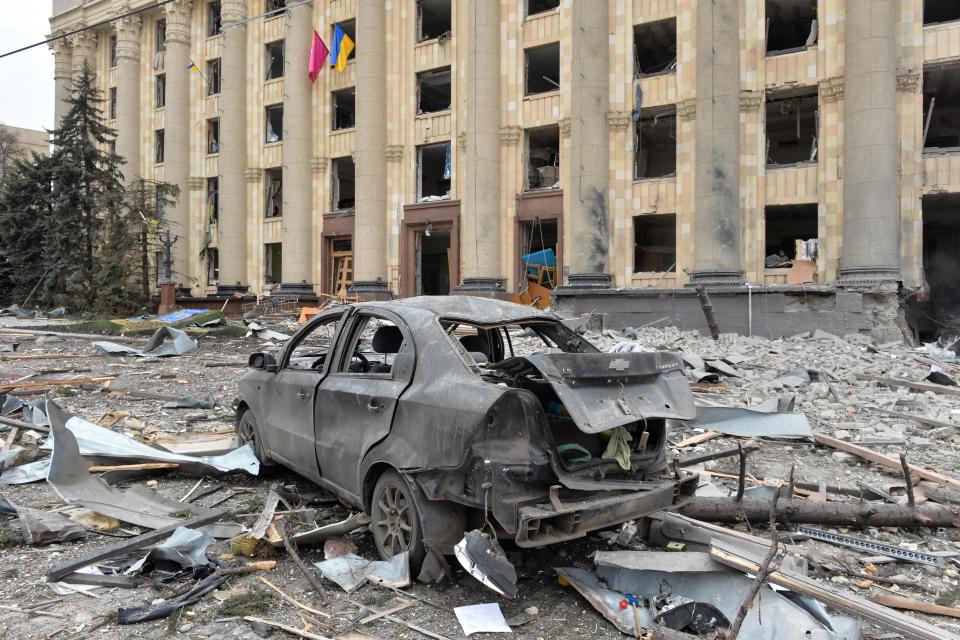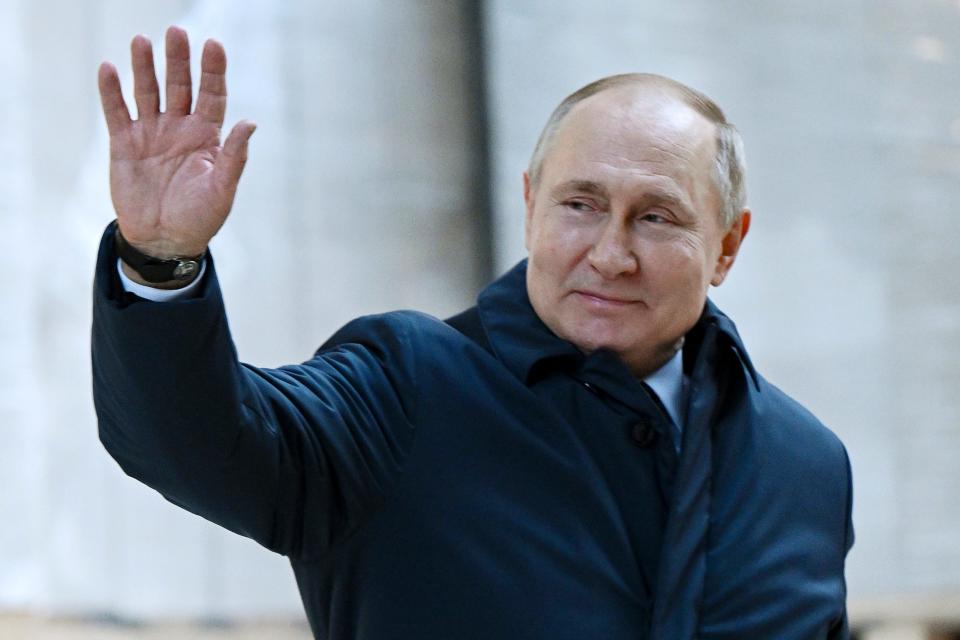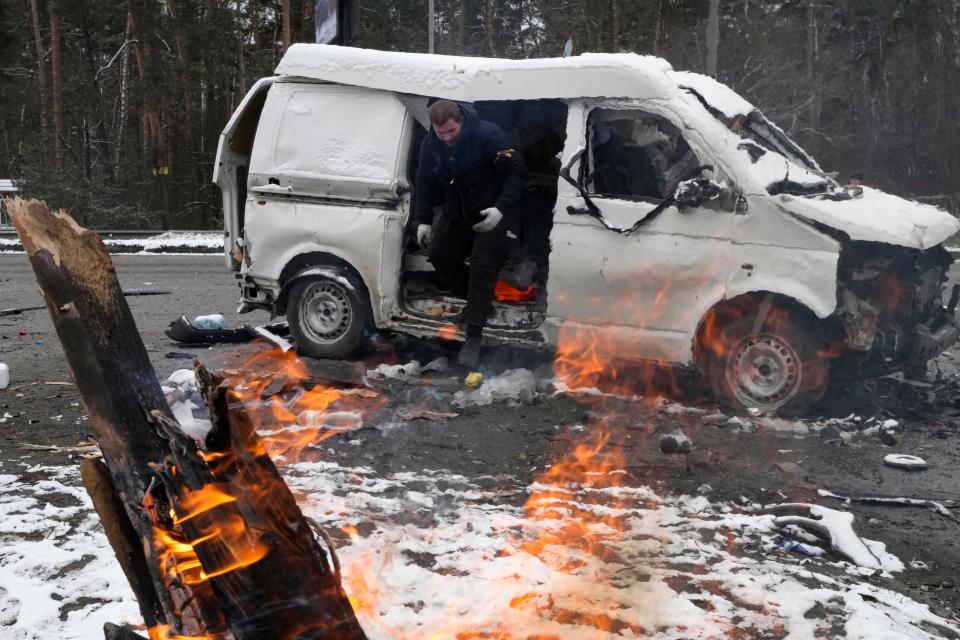Is Vladimir Putin committing war crimes? Likely, but calling him out is unlikely to stop him, observers say
- Oops!Something went wrong.Please try again later.
WASHINGTON – Russian troops have killed thousands of civilians, including an unknown number of children, and shelled apartment buildings and neighborhoods in their assault on Ukraine, realities that qualify Russian President Vladimir Putin as a war criminal, observers say.
President Volodymyr Zelenskyy described Putin’s attack on the residential center of Ukraine’s second-largest city as “frank, undisguised terror. Nobody will forgive. Nobody will forget. This attack on Kharkiv is a war crime.”
So far, as many as 2,000 Ukrainian civilians have been killed by Russian shelling and other military activities, the Kyiv government said in a posting on the website of its State Emergency Service.
On Monday, the chief prosecutor at the International Criminal Court in The Hague said he plans to open an investigation "as rapidly as possible" into possible war crimes and crimes against humanity in Ukraine. Already, Putin’s war against his far smaller neighbor to the west has created as many as 874,000 refugees.

But can the urgency to bring Putin before the international bar of justice prevent him from killing more innocent civilians if Russia’s 40-mile military convoy reaches Ukraine’s largest city and capital, Kyiv?
The short answer is probably not, according to war crimes experts.
They say that the post-World War II effort to create an international framework to thwart brutal dictators like Adolf Hitler is too toothless, caught up in power politics and focused on war crimes already committed to make a difference when it comes to Russia’s invasion.
More: Biden hits Russia's yacht-riding rich with sanctions. Will that blunt Putin's Ukraine invasion?
"Is Vladimir Putin committing a war crime? Yes. It’s very clear," said David Schwendiman, a former senior Justice Department lawyer and international war crimes prosecutor.
Using the formal definition of war crimes, “you put Putin in the very same class as the people who were prosecuted at Nuremberg” for leading the Nazi campaign to exterminate Jews and other minorities, said Schwendiman, who headed the Special Department for War Crimes in Bosnia and Herzegovina for four years beginning in 2006.
Like Schwendiman, other war crimes experts said the publicly available evidence against Putin is considerable.
"I think Russia has taken an extraordinarily brutal approach to Ukraine. And I think that they are clearly, from the imagery that we're seeing, disregarding the rules of war,” said Michael Scharf, who argued a case before the International Criminal Court just last week and has served in the Office of the Legal Adviser at the State Department.

Anthony Dworkin, a war crimes expert and senior policy fellow at the European Council on Foreign Relations in London, said Putin’s actions in Ukraine follow a consistent pattern dating back to the military conquest of Chechnya in 1999 that preceded his rise to power and Russia’s actions more recently in Syria. "There's a lot of strong evidence of Russian forces attacking civilian infrastructure, attacking hospitals, basically attacking civilian buildings,” Dworkin said. “All of those are war crimes.”

“But I don’t think he cares. It doesn't matter,” Schwendiman said, noting that Putin’s armies have committed numerous war crimes before. “This is a pure and simple exercise of power. And the law in these circumstances will probably never constrain that kind of exercise of power.”
Another war crimes expert, former Pentagon special counsel Ryan Goodman, was equally skeptical about whether the ICC – and the related International Court of Justice – could make an immediate difference.
"The wheels of international criminal justice turn slowly, so it is unclear how much of an impact (the two international courts) can have in the present crisis," said Goodman, a member of the State Department’s Advisory Committee on International Law. "The Russians are considering risks and benefits on a much shorter time horizon."
An urgent international mobilization
On Wednesday, President Joe Biden said "it's clear" Russia is targeting civilians in Ukraine, but he stopped short of saying be believes war crimes are being committed.
“We are following it very closely," Biden said as he departed the White House. "It’s too early to say that.”
Hours later, the British government announced it is leading a coalition of 38 countries requesting a formal ICC investigation into Russian war crimes in Ukraine. The so-called state party referral, the largest in the history of the ICC, enables ICC Chief Prosecutor Karim A. A. Khan to proceed straight to an investigation, without the need for judicial approval.
The UK Foreign Office's announcement said Russia’s use of "indiscriminate force against innocent civilians, in its illegal and unprovoked invasion of Ukraine, amounts to war crimes, for which the Putin regime must be held accountable.“
“Putin’s military machine is targeting civilians indiscriminately and tearing through towns across Ukraine," said Foreign Secretary Liz Truss. "An investigation by the International Criminal Court into Russia’s barbaric acts is urgently needed and it is right that those responsible are held to account. The UK will work closely with allies to ensure justice is done.”
Since Nuremberg, it has been a fundamental principle of international law – as embodied in the United Nations Charter – that every nation must refrain from using force against the sovereignty, territorial integrity or political independence of any other state. That’s called the “crime of aggression,” and beyond that, there are more serious violations that constitute what are more commonly known as war crimes – including the intentional targeting of civilians and using excessive force to maintain one’s military objectives.
More: What is a war crime? Ukraine accuses Russia of them, but what exactly constitutes a war crime?
So while the United States violated the U.N. charter by going to war in Iraq in 2003, it escaped most accusations of war crimes because its “shock and awe campaign” used precision military air and cyberattacks to take out legitimate military targets, and at times and locations that would minimize casualties, according to Scharf.
Thanks to recent advances in technology – including commercial satellite imagery and viral videos circulated on social media – Putin’s brazen assault on Ukraine has become one of the most documented cases of suspected war crimes in history.
Given all of that potential evidence in the public domain, Khan said there is a "reasonable basis to believe" that war crimes and crimes against humanity have been committed in Ukraine in announcing the formal investigation.
Khan has since put all potential combatants and their commanders – including from Ukraine and Belarus, which is helping Russia – on notice that he is monitoring their activity and has jurisdiction to potentially prosecute them for war crimes violations.
The ICC investigation will build on an existing effort by international court investigators to document potential war crimes in Ukraine since late 2013 under the leadership of former Ukrainian President and pro-Russian strongman Viktor Yanukovych. In early 2014, state police and armed forces killed dozens of pro-democracy protesters. And later that year, Russia sent troops into Ukraine to annex the Crimean Peninsula by force.
"Given the expansion of the conflict in recent days,” Khan wrote in his announcement Monday, “it is my intention that this investigation will also encompass any new alleged crimes falling within the jurisdiction of my Office that are committed by any party to the conflict on any part of the territory of Ukraine.”
But there are significant questions about whether Khan and the ICC even have the jurisdiction to investigate Putin and other Russian leaders.
More: Civilians injured in Russian attacks on Ukraine
Neither Russia nor Ukraine – or the United States for that matter – are official signatories to the ICC, which means any action taken by the international court could be subject to appeal. Russia, no doubt, would also block efforts to escalate the matter to the United Nations itself, given its influence as a permanent member of the U.N. Security Council with veto power over any resolution, war crimes experts like Schwendiman, Scharf and Goodman say.
The International Court of Justice in The Hague, which hears cases lodged by one country against another, faces similar problems of jurisdiction if it decides to try to hold Russia accountable, said Dworkin.
Khan alluded to that in his announcement, saying that because Ukraine is not a party to what is known as the Rome Statute of the International Criminal Court, “it cannot itself refer the situation to my Office.”
But, Khan noted, Ukraine has twice exercised its prerogatives to legally accept the ICC’s jurisdiction over possible war crimes occurring on its territory. It first did so with respect to suspected crimes related to the pro-democracy protests – known as the Maidan uprising – from November 2013 to February 2014. And later, Khan said, it issued a second declaration that effectively created an “open-ended” acceptance of the ICC’s jurisdiction to investigate accusations of war crimes committed on its soil.
The ICC has already initiated a preliminary investigation. If history is any guide, Khan will ramp up that effort by deploying prosecutors to assemble whatever evidence they can from public sources, and from Ukraine and other government and private-sector entities that may have them, Dworkin said.
By all accounts, Putin has stepped up his military campaign in Ukraine. As of Tuesday, the massive convoy headed toward Kyiv appeared to be bogged down while it was still several miles outside city limits. But as the attacks on Kharkiv and other cities showed, Russian troops were using light and heavy weapons, artillery rounds and airstrikes – and have been accused of deploying thermobaric bombs and cluster munitions – to kill civilians in clear violation of the laws of war.
One Ukrainian media organization, Slovo i Dilo, has documented dozens of specific attacks that it says are violations of international humanitarian law. Those include a Feb. 24 artillery shelling of a hospital in Vuhledar and the shelling of residential high-rise buildings in Starobilsk.
In response, Zelenskyy filed an urgent request to initiate formal proceedings against Russia before the International Court of Justice, the principal judicial organ of the United Nations that also operates out of The Hague.
Other attacks have occurred in Kyiv already, and Kharkiv has come under sustained and heavy attack, including the shelling of a major blood center and Children’s Regional Hospital. A missile that struck the center of Kharkiv early Tuesday injured at least six people and caused significant damage, according to the State Emergency Service of Ukraine.
In response, Khan appealed to the international community for whatever money and personnel it could provide to help speed his investigation and make a public case for restraint and strict adherence to the applicable rules of international humanitarian law.
“The importance and urgency of our mission,” Khan said, “is too serious to be held hostage to lack of means.”
Even the most forceful calls by the ICC, the United Nations and the international community at large are unlikely to prompt Putin to change course and stop attacking civilian population centers in Ukraine, the war crimes experts said.
Biden administration officials have repeatedly condemned Putin, as have other world leaders, and not just for his actions now in Ukraine.
Time and again they have called him out for violations of the laws of war, including when Russian troops invaded Georgia in 2008, poisoned Russian dissidents with nerve agents and radioactive polonium in the heart of Europe and sent troops to Syria to help Putin ally President Bashar al-Assad kill his own people with chemical weapons.
But none of that has stopped Putin, in part because he believes he is not accountable for international war crimes violations, according to Scharf and others.
A dubious record of acting as a deterrent
The international community has had a spotty track record, at best, of investigating war crimes and holding despots accountable, even when it has succeeded in bringing them to trial.
There have been major successes. In 1993 and 1994, two ad hoc courts were created for specific conflicts in which the internationally accepted laws of war – especially prohibiting genocide – had been repeatedly violated.
The first was the International Criminal Tribunal for the former Yugoslavia, where Serbian forces engaged in mass murder of civilians in what became known as an “ethnic cleansing” campaign.
That tribunal ended a 50-year system of having laws and treaties in place to govern the rules of conflict during warfare, but no real system to prosecute individuals who broke those laws, according to Schwendiman, who prosecuted some of the cases.
Other ad-hoc tribunals followed, including a successful effort to bring to justice those who committed horrific acts of genocide in the African nation of Rwanda in 1994.
Those two courts laid the foundation for what would later become the Rome Statute, which in turn established the ICC in 1998 as a permanent judicial body – a court of last resort – that could prosecute people accused of committing war crimes, crimes against humanity and genocide when individual countries couldn’t or wouldn’t act against them.
But the ICC itself has struggled to bring major violators to justice – and act as a deterrent – since it began operating full-time at The Hague in the Netherlands in 2002.
More than 120 nations signed on as signatories, and it has served as a deterrent of sorts for putting despots around the world on notice that they could be held accountable for violations of international law.
By 2016, though, only Africans had been brought to trial there, prompting accusations of bias – and the withdrawal of some countries as signatories. And at least four high-profile cases brought against African dictators accused of war crimes were not successful.
Ignoring the international rule of law
And because the ICC relies on the United Nations for its authority, the leaders of powerful nations know that they can essentially thwart efforts to prosecute them there – and continue to flout the laws of war if they want to, Schwendiman and others said.
“We’ve got a long way to go before the ICC matures to the point where people will respect the rule of law to the extent that they would submit themselves to its jurisdiction,” Schwendiman said. “That’s especially the case when you’re dealing with someone as powerful as Vladimir Putin who believes he is above the law.”
Goodman, the former Pentagon lawyer, said an aggressive ICC might have some immediate benefits.
"It will help to cast Russia into a pariah status in the international community," he said, and help dissuade members of the Russian armed forces from being complicit in war crimes.
"A war crimes prosecutor with clear jurisdiction and worldwide political support is an unusual phenomenon and might help change the equation," Goodman said. "Russian leaders may consider this an added cost to their ongoing war effort."
Down the line, experts said, it could also impede Putin and other Russian leaders’ ability to travel globally for fear of arrest.
World leaders like Putin also enjoy some expectation of “state immunity” from prosecution given their position as a head of government, said Scharf, who is now dean of the Case Western University School of Law.
But, Scharf noted, there is no statute of limitations for international war crime violations, and the ICC has been dogged in the past about waiting for the right moment to strike.
That was the case with Sudan President Omar al-Bashir, who spent years traveling the world after the ICC accused him of genocide and other war crimes, dodging requests that various countries hand him over to the ICC.
“He just thumbed his nose at international justice and showed how weak it really was. And if he can do that, then Putin surely thinks he can do that,” Scharf added. “The problem though is that you can only do that for so long because international justice is persistent, and patient.”
Ultimately, though, al-Bashir fell from power, and now he's under arrest.
"And the government of Sudan is negotiating with the ICC to turn him over,” Scharf said. “And the same thing could happen to Putin.”
This article originally appeared on USA TODAY: Is Putin committing war crimes in Ukraine? It's likely, say observers

